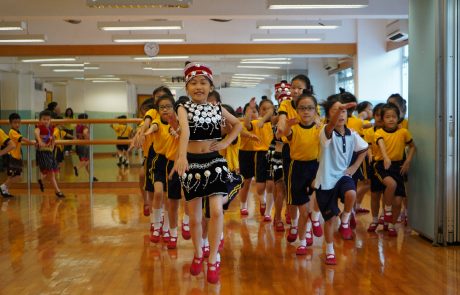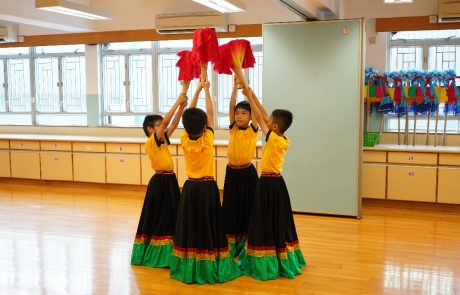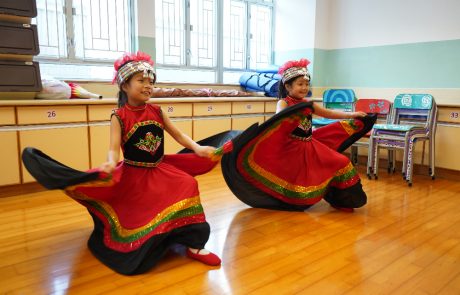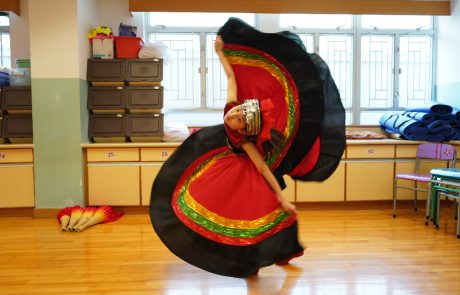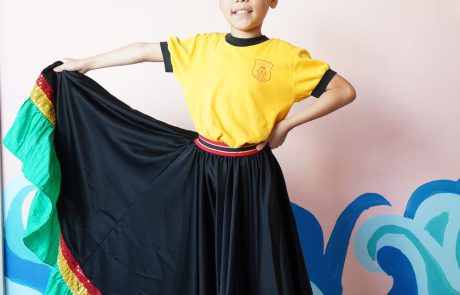After school, a group of primary school students practise dancing in the dancing room of The Salvation Army Tin Ka Ping School. Divided into two groups, Lower Primary Dance Group (LPDG) and Upper Primary Dance Group (UPDG), the students are doing joyful Chinese dance in their gorgeous costumes. If you look carefully, you will notice these groups, unlike the usual all-girl dance groups, consist of both boys and girls.
Strive for perfection
On the day of the interview, members of both LPDG and UPDG were busy rehearsing for the upcoming Sha Tin District Dance Competition, where the LPDG was to perform an energetic Jingpo dance, and the UPDG an elegant Yi dance. These two dances are so choreographed that they demand high levels of cooperation and understanding among the dancers. ‘Because it’s a large-scale dance that we all have to work together, stage positioning and coordination is challenging. We need to make room for one another as we move around and be in the right position at the right timing, all these require tacit connection among dancers, so now we will practise and practise so as to achieve flawless cooperation among us,’ four members of the UPDG, Alyssia Lee, Zoe Chan, Yuki Chung and Castor Wong, agreed.
Moreover, Chinese dance involves many highly difficult moves that take time to practise, such as sweeping turns and windmills. These four members not only rehearse for the dance at school, but they also practice each move at home by breaking it down to details. Yuki Chung even asks her parents to watch her dance and give her feedbacks, ‘If there’s any move I didn’t do well during the practice, I’ll ask my parents to watch me do it once more at home and give me some comments. Very often they remind me to smile more when I dance, which is helpful as in the past I was arranged to dance upstage because I lacked smile or facial expression.’
A mixed-gender dance group
It is common to think that mainly girls would be participating in traditional dances like Chinese dance, and boys will instantly draw more attention when they join the group. Castor Wong said, ‘I was invited by our teacher Ms Chan to join the dance group when I was in Primary 2. At that time, few boys would do Chinese dance, so I wanted to challenge myself in that.’ Both boy and girl members of the groups have a great time together even during their practices. They practice seriously, but they also play hard and joke around with each other without any embarrassment.
Ms Chan admits that one of the biggest characteristics of The Salvation Army Tin Ka Ping School dance groups is their mixed gender composition. ‘Many Chinese dance repertoires are themed on joyful festivities or abundant harvest, and the music is usually rather lively and vigorous. That’s why we need both boys and girls in the group to deliver an energetic performance. It also allows more variety to the dance. Therefore, I’ll recruit any students I find suitable. Sometimes, some boys may think doing Chinese dance is just too feminine and I’ll tell them boys can also do handsome and bold moves, and they will look dashing in costumes.’
Benefited from dancing and stage performances
Parents with traditional perceptions may think learning traditional dance may make boys become ‘sissy’ – Has it been a hindrance for recruiting boy members to the dance groups? Not from Ms Chan’s observation. In fact, she thinks parents are in general supportive of the idea, ‘Our recruitment is usually arranged some time after the School Open Day, by the time many parents would have seen our performances and impressed by the handsome moves our boy dancers can do, such as sweeping turns and wind-and-fire wheels. That’s why they are fine with their kids joining us.’ Understandably, many boys thought they would have to do rather feminine moves when Ms Chan first invited them to join the groups. ‘I will explain to them it is not so actually. Later, after taking part in a competition, very often they’ll have a boost of confidence and become more interested in and devoted to dancing.’
Thankfully, the dance groups have been widely supported since they were established. They have won numerous awards over the years and performed in Sha Tin Town Hall from time to time. Ms Chan remembered that she was more concern about winning in the first few years, but now she would rather see students gaining confidence and widening their horizons from dancing and performing on stage. ‘After performing on stage, many students who used to be shy have become bolder and confident. The dance groups’ practice is also a training for the body, concentration and memory.’



